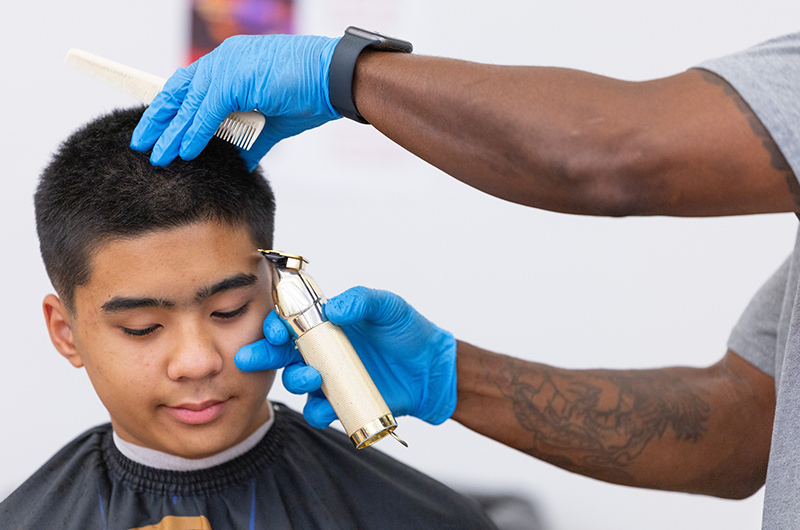Iowa State will seek nearly $11.8 million in additional appropriations from the state in the year that begins July 1, 2025. The state Board of Regents sends the universities' appropriations requests to the state by Oct. 1 each year, and President Wendy Wintersteen shared Iowa State's requests with board members during their Sept. 19 meeting in Ames.
The university is not asking for an increase to its general university operating support. Instead, its seven requests are grouped around two focus areas: Enhancing Iowa's rural economy and supporting Iowa businesses. The seven are:
Enhancing Iowa's rural economy
- Incremental operations funding for the Ag Experiment Station ($3.75 million) and Cooperative Extension ($1 million) to help maintain the state's agricultural competitiveness and explore opportunities for growth. Three proposed focus areas are: agricultural workforce and entrepreneurship, digital and precision livestock and crops, ag economics policy and training.
- New support ($4 million) to open four manufacturing hubs in partnership with regional educational institutions and create new avenues for students and manufacturing employees to complete four-year and advanced degrees. Funding would upgrade existing training centers with advanced technologies and update and align curricula. The name for the concept is MakeIowa.
- New support ($1 million) for scholarships that assure in-state tuition at the College of Veterinary Medicine for up to 10 students/year accepted into the ISU Production Animal – Veterinary Early Acceptance Program established in 2023. Upon graduation, the scholarship would be forgiven if a veterinarian worked for five years as a food animal veterinarian in rural Iowa.
- Incremental support ($250,000) for livestock disease research, to leverage even more external research funding and combat threats to the state's livestock industry.
Supporting Iowa businesses
- Incremental operations support ($1.5 million) for the Veterinary Diagnostic Laboratory (VDL), particularly its new Biosafety Level 2 facility. Current appropriations and the lab's fee income can't cover this expense. Wintersteen noted that 16% of the VDL's operating budget comes from state appropriations, compared to an average 48% at other VDLs.
- New support ($250,000) for staff and operations in entrepreneurship, for example, competition prizes, travel to national conferences and competitions for students and professional mentoring for faculty.
- Additional support ($36,000) to reach a total of $3 million annually ($1 million each) for the three state bioscience platforms based at Iowa State (biobased products, vaccines and immunotherapeutics, and digital and precision agriculture), getting to the funding goal established in 2017 when the initiative launched.
Read more
Other Iowa State items on the regents' September meeting agenda
In addition, the board will send to the state a $30 million capital request in FY 2026 for deferred maintenance projects at the three universities. Each university has projects that would be priorities for these funds.
Associate vice president for facilities management Wendy Kisch shared a five-year, $32 million proposal (using $7 million of the $30 million request) to renovate Atanasoff Hall for the computer science department, which offers one of Iowa State's largest undergraduate majors (983 in fall 2023). Additionally, computer science courses increasingly are requirements for majors in other programs.
Completed in 1969, Atanasoff still has most of its original systems, and labs and offices are outdated.
Campus inclusion reviews
In other business, board president Sherry Bates said a coordinated review began this summer of offices and positions doing work related to diversity, equity and inclusion (DEI) on the three regent campuses, as required by the spring 2024 education appropriations legislation. The bill, commonly referenced as Senate File 2435, includes new sections that restrict diversity, equity and inclusion efforts at the three regent universities. Those restrictions take effect July 1, 2025. Regents Bates, David Barker, JC Risewick and Greta Rouse are working with board office and university staffs to comply with the law.
Bates said the group will complete its work by Dec. 31. Their process at each university:
- Identify and understand relevant state and federal law and accreditation requirements.
- Conduct a unit-by-unit analysis of units and positions, both central and distributed.
- Identify DEI programs, units and positions "provided for" by law or accreditation.
- Identify DEI programs, units and positions that require additional review and potential action.
"We are aware there are instances, events or programs that can be perceived as going too far. As we learn of them, we review them in the light of the law and address them appropriately," Bates said. "That's been our practice in the past and will continue to be our practice in the future."
At the Nov. 7 regents meeting, she said the board will receive a progress report on the review, relative to the Dec. 31 targeted deadline.

